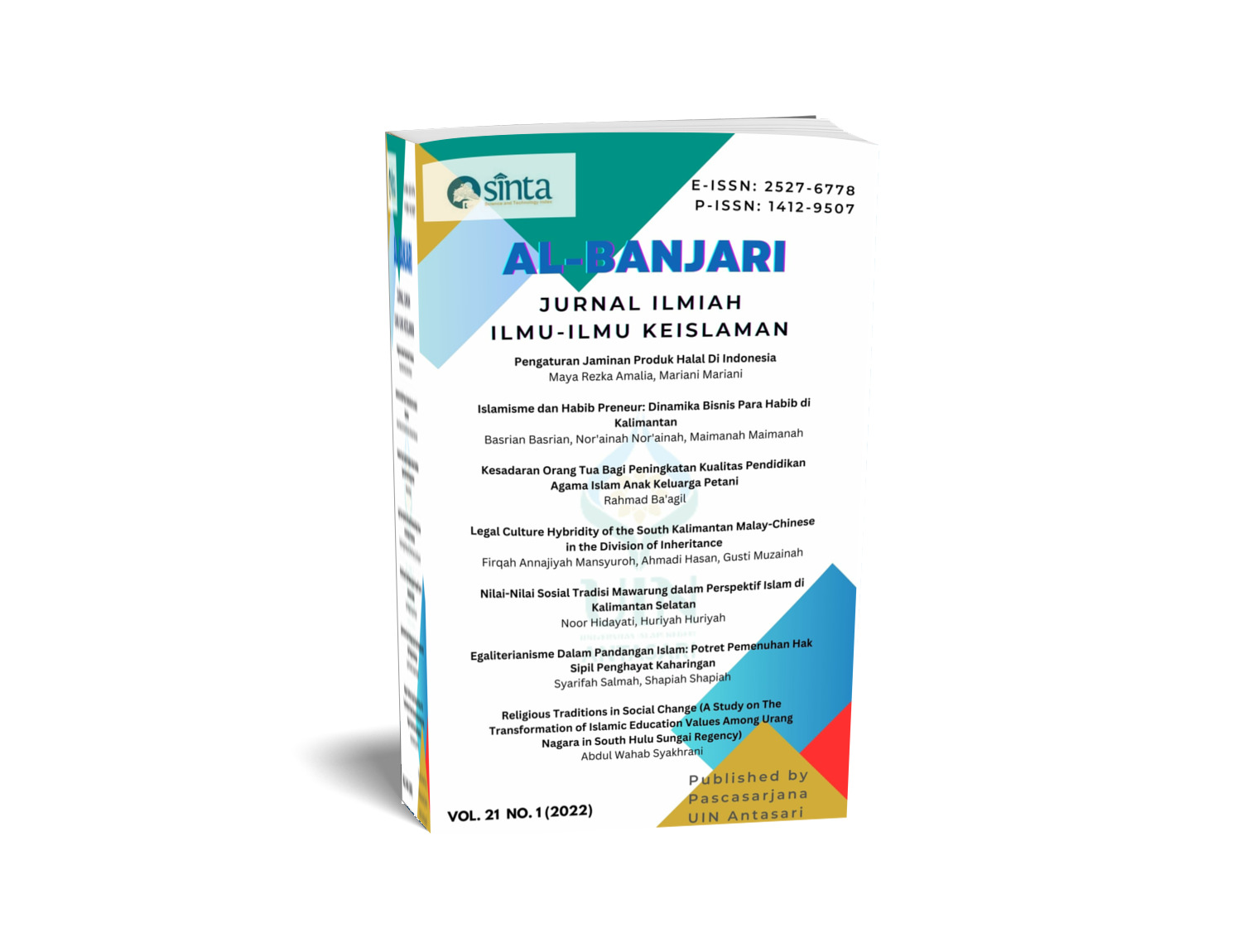Legal Culture Hybridity of the South Kalimantan Malay-Chinese in the Division of Inheritance
DOI:
https://doi.org/10.18592/al-banjari.v21i1.6861Keywords:
Malay-Chinese, Legal Culture, Inheritance Customary Law, HybridityAbstract
Cultural negotiation is essential because the process always involves conflict and differences. Malay-Chinese is one of the minority groups in South Kalimantan. This study aims to find out how Malay-Chinese culture negotiates differences in the legal culture of inheritance distribution between Chinese customary law, Malay custom, and Islamic law. This research is empirical legal research conducted under an interdisciplinary umbrella. This type of research is field research or research, empirical law. In this study, the author uses a legal sociology approach or practical juridical approach, which is an approach that looks at the legal reality in society, and a legal anthropological approach. The research findings show that Malay-Chinese negotiates differences in Islamic values and religion by choosing or combining the two cultural values. The negotiation process is carried out by applying cultural values as they are ethnic and adapt to the cultural values of Malay Islam. This cultural negotiation process then builds a hybrid Malay-Chinese identity. Resistance, their hybridity is used to survive and to fight the dominant Malay Islamic cultural values.References
Ekawaty, Yuliana Ira, M. Arfin Hamid, and Muhammad Basri. “Pembagian Harta Warisan Muslim Tionghoa: Studi Komparatif.” Amanna Gappa 28, no. 1 (2020): 21–30.
Hasan, Ahmadi. “Penyelesaian Sengketa Hukum Berdasarkan Adat Badamai Pada Masyarakat Banjar Dalam Kerangka Sistem Hukum Nasional.” Universitas Islam Indonesia, 2007.
Judiasih, Sonny D., Afifah Syakira, Natalia Karelina, Noer A. Januariska, Purri Trirani, and Zeira Nabilla. “Pergeseran Norma Hukum Waris Pada Masyarakat Adat Patrilineal.” RechtIdee 16, no. 1 (2021): 65–87.
Kuswarno, Engkus. Etnografi Komunikasi: Suatu Pengantar Dan Contoh Penelitiannya. Bandung: Widya Padjajaran, 2008.
Pieterse, J N. Globalization and Culture: Global Melange. Maryland: Rowman and Littlefield Publishers, Inc., 2009.
Saebani, Beni Ahmad, and Encup Supriatna. Antropologi Hukum. Bandung: Pustaka Setia, 2012.
Sriono. “Sistem Pewarisan Pada Warga Negara Indonesia Keturunan Tionghoa (Cina) Muslim.” Jurnal Ilmiah Advokasi 05, no. 02 (2017): 110–22.
Suteki, and Galang Taufani. Metodologi Penelitian Hukum (Filsafat, Teori Dan Praktik). Depok: Raja Grafindo Persada, 2018.
Widiastuti, Kurnia, and Anna Oktaviana. “Bentuk Dan Makna Rumah Tinggal Etnis Tionghoa Di Banjarmasin.” Info Teknik 16, no. 2 (2015): 1689–99. doi:10.1017/CBO9781107415324.004.
Yunariono, Bastian. “Identitas Hibriditas Masjid Tionghoa Muslim Di Indonesia.” BioKultur VIII, no. 2 (2019): 35–57.
Downloads
Published
Issue
Section
License
Copyright (c) 2022 Al-Banjari : Jurnal Ilmiah Ilmu-Ilmu Keislaman

This work is licensed under a Creative Commons Attribution-ShareAlike 4.0 International License.
Authors who publish with this journal agree to the following terms:
- Authors retain copyright and grant the journal right of first publication with the work simultaneously licensed under a Creative Commons Attribution License that allows others to share the work with an acknowledgement of the work's authorship and initial publication in this journal.
- Authors are able to enter into separate, additional contractual arrangements for the non-exclusive distribution of the journal's published version of the work (e.g., post it to an institutional repository or publish it in a book), with an acknowledgement of its initial publication in this journal.
- Authors are permitted and encouraged to post their work online (e.g., in institutional repositories or on their website) prior to and during the submission process, as it can lead to productive exchanges, as well as earlier and greater citation of published work (See The Effect of Open Access).


































